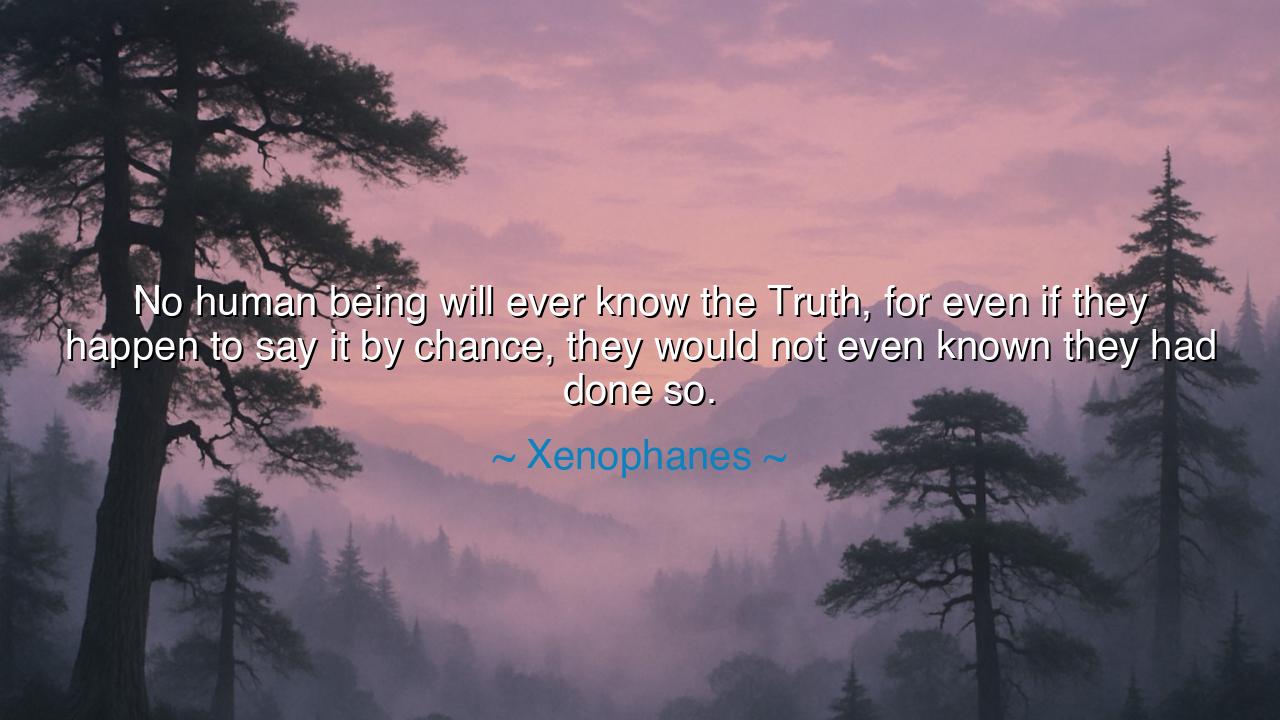
No human being will ever know the Truth, for even if they happen
No human being will ever know the Truth, for even if they happen to say it by chance, they would not even known they had done so.






In the vast and unfathomable sea of knowledge, where truth and reality are often clouded by human limitations, the ancient philosopher Xenophanes offers a sobering thought: “No human being will ever know the Truth, for even if they happen to say it by chance, they would not even know they had done so.” These words cut through the illusions of certainty and ego, reminding us that the truth we seek is elusive, often beyond the reach of human understanding. Xenophanes’ statement challenges us to confront our limitations, urging humility in our pursuit of knowledge and a recognition that no matter how much we learn, we remain far from absolute truth.
In the ancient world, philosophers wrestled with the nature of truth. The Greeks, especially, were keenly aware of the limits of human knowledge. Socrates, for instance, famously declared that he knew nothing except that he knew nothing, acknowledging the vastness of truth beyond human comprehension. The pursuit of wisdom, for Socrates, was not about claiming to have all the answers but about the ongoing dialogue and search for deeper understanding. Xenophanes, too, recognized that human beings, trapped in their own perceptions and biases, could never fully grasp the universal truth that lies beyond the reach of their minds. Truth, in this sense, was not a fixed entity but something that could only be approached, never fully attained.
The story of Heraclitus, another philosopher of the ancient world, further illustrates this point. Heraclitus is often remembered for his assertion that “everything flows” and that change is the only constant in the universe. To him, the search for truth was not about static, absolute answers but about understanding the dynamic flow of life, the interconnectedness of all things. Heraclitus’ view aligns with Xenophanes’ assertion: even if we happen upon the truth, we might never recognize it, for truth is ever-changing, slipping through our fingers like water. Heraclitus understood that the truth was not a destination but a journey, an unfolding of the unknown that humans could only partially experience and never entirely possess.
In the modern world, this ancient wisdom is reflected in the scientific method and the pursuit of knowledge. Even the most brilliant minds, such as Einstein or Curie, who have made groundbreaking contributions to science, would admit that truth is always evolving. Einstein himself acknowledged that his theories, while revolutionary, were only approximations of the greater truths that the universe holds. Each discovery led to more questions, more mysteries, proving that the search for truth is a journey without end. In this sense, Xenophanes' words are as relevant today as they were in antiquity—truth is a horizon, ever distant and unattainable, no matter how far we reach.
The lesson embedded in Xenophanes' thought is one of humility. We must approach the search for truth with the understanding that we are but frail mortals, limited by our senses, experiences, and the confines of our own minds. While we may uncover fragments of truth, these moments are fleeting, and they do not grant us mastery over all that is known or unknown. Just as Xenophanes saw the divine as an unknowable force, we too must recognize that truth exists beyond the scope of our understanding. The truth we encounter in life is often shaped by our perspective, and even when we think we have found it, we may not truly understand it.
Let us look at the life of Socrates, who famously said that the only true wisdom is in knowing that we know nothing. This statement, though paradoxical, reveals the deeper truth that wisdom is not about having all the answers but about recognizing the limitations of our knowledge. Socrates, though deeply insightful, never claimed to possess the ultimate truth—instead, he encouraged his followers to engage in thoughtful dialogue, to question and reflect on the world around them. His method was not one of declaring truths but of exploring questions, understanding that the pursuit itself was more important than any final answer. In this, he mirrors Xenophanes' assertion that truth is something that slips away, even as we seek it with all our might.
In our own lives, we must approach truth with a sense of reverence and humility. While the pursuit of knowledge is vital, it must be undertaken with the understanding that we can never truly possess absolute truth. Instead, we should focus on the process of seeking, of remaining open to new ideas, perspectives, and experiences that deepen our understanding. Xenophanes' wisdom teaches us that even if we stumble upon a truth, it is likely that we will not recognize it as such in the moment. And that is okay, for the pursuit itself—the asking of questions, the challenge to our assumptions—is what gives our lives depth and meaning.
Let us, therefore, live with the awareness that truth is not a destination but an ongoing journey. We may never fully grasp it, but in our search for it, we become wiser, more open, and more connected to the mysteries of the universe. Xenophanes urges us not to seek finality, but to embrace the process of seeking, knowing that in doing so, we move ever closer to understanding—not all, but perhaps just enough.






AAdministratorAdministrator
Welcome, honored guests. Please leave a comment, we will respond soon